Over 30 years of anarchist writing from Ireland listed under hundreds of topics
Andrew N Flood
The experience of the Social Solidarity Network
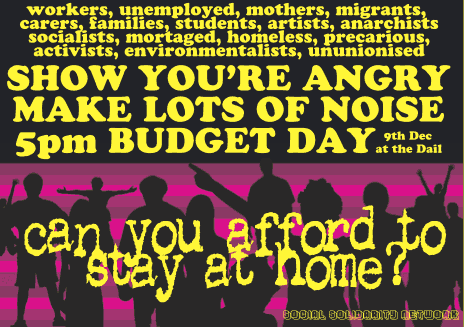 The Social Solidarity Network came into existence in the Autumn of 2009 in Dublin as an initiative of the Workers Solidarity Movement. It faded out of existence a few short months later and never amounted to all that much in the interim beyond a couple of meetings, a leaflet distribution at a mass ICTU march and a badly organised and executed protest at the Dail on budget day. Nevertheless there are some useful lessons (mostly of the ‘how not to do it variety’) to be taken from its short existence.
The Social Solidarity Network came into existence in the Autumn of 2009 in Dublin as an initiative of the Workers Solidarity Movement. It faded out of existence a few short months later and never amounted to all that much in the interim beyond a couple of meetings, a leaflet distribution at a mass ICTU march and a badly organised and executed protest at the Dail on budget day. Nevertheless there are some useful lessons (mostly of the ‘how not to do it variety’) to be taken from its short existence.
Anger explodes at Youth Defense anti-choice posters targeting women - video shows paint thrown over posters
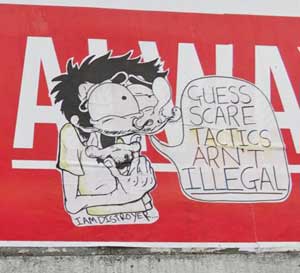 A video being circulated on the internet shows Youth Defense anti-choice posters being sprayed with paint. Over the last month more and more bill boards from the anti-women anti-choice organisation Youth Defense have been appearing all over Dublin. It appears they have spent hundreds of thousands of euro in their latest campaign targeting women who have had abortions. In the last days we have seen or been sent photos of their posters that have been altered all over the city and just now we received notification of the video below which shows several of these sites being covered with paint or torn down.
A video being circulated on the internet shows Youth Defense anti-choice posters being sprayed with paint. Over the last month more and more bill boards from the anti-women anti-choice organisation Youth Defense have been appearing all over Dublin. It appears they have spent hundreds of thousands of euro in their latest campaign targeting women who have had abortions. In the last days we have seen or been sent photos of their posters that have been altered all over the city and just now we received notification of the video below which shows several of these sites being covered with paint or torn down.
Revolutionary Organization in the age of Networked Individualism
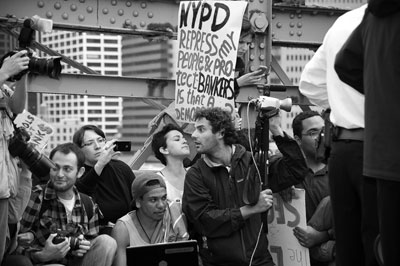 The revolutions and revolts that swept the world in 2011 took almost everyone by surprise. One of the first strong attempts to explain why they happened is Paul Mason’s ‘Why It’s Kicking Off Everywhere.’ He argues that “the materialist explanation for 2011...is as much about individuals versus hierarchies as it is about rich against poor.” By far the most provocative element of his book is the idea that communications technology, in particular the internet, is transforming the way people behave and that a significant contribution to the revolts of 2011 lie in these changes. If he’s right it had profound consequences for the form and structure of revolutionary organisations including anarchist ones.
The revolutions and revolts that swept the world in 2011 took almost everyone by surprise. One of the first strong attempts to explain why they happened is Paul Mason’s ‘Why It’s Kicking Off Everywhere.’ He argues that “the materialist explanation for 2011...is as much about individuals versus hierarchies as it is about rich against poor.” By far the most provocative element of his book is the idea that communications technology, in particular the internet, is transforming the way people behave and that a significant contribution to the revolts of 2011 lie in these changes. If he’s right it had profound consequences for the form and structure of revolutionary organisations including anarchist ones.
This article also availale on audio & video, see end.
Bloody Sunday in Derry - Origins & Consequences of a Massacre
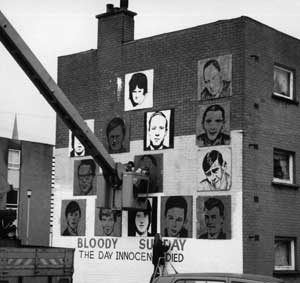 On the 30th January 1972 British soldiers opened fire on protesters in the city of Derry, north-west Ireland. Twenty six unarmed protesters were shot, 13 died immediately or within hours, one more died just over four months later. Derry was in the section of Ireland claimed by the British state and the shootings happened in the context of the suppression of a growing civil rights movement demanding equality for Catholics in the 6 of Ulster’s counties claimed by Britain.
On the 30th January 1972 British soldiers opened fire on protesters in the city of Derry, north-west Ireland. Twenty six unarmed protesters were shot, 13 died immediately or within hours, one more died just over four months later. Derry was in the section of Ireland claimed by the British state and the shootings happened in the context of the suppression of a growing civil rights movement demanding equality for Catholics in the 6 of Ulster’s counties claimed by Britain.
London burns - causes & consequences of the riots - an anarchist perspective
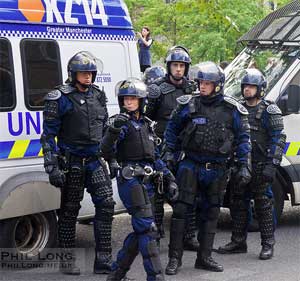 The police killing of Mark Duggan resulted in four nights of rioting across England. The immediate trigger was the killing itself, and the disrespect shown by the police to Mark’s family and friends. But the riots rapidly broadened to expressions of a more general anger and alienation; an anger that was all too often unfocused and striking out at the nearest target of opportunity. This resulted in widespread destruction of resources in already deprived neighborhoods and some anti-social attacks on bystanders. Despite this, the roots of the riots lie in the economic and political conditions of these districts, and not in ‘poor parenting’ or ‘mindless criminality’. These conditions were created by the very politicians and business elite who now call for a return to normality and repression. [French translation]
The police killing of Mark Duggan resulted in four nights of rioting across England. The immediate trigger was the killing itself, and the disrespect shown by the police to Mark’s family and friends. But the riots rapidly broadened to expressions of a more general anger and alienation; an anger that was all too often unfocused and striking out at the nearest target of opportunity. This resulted in widespread destruction of resources in already deprived neighborhoods and some anti-social attacks on bystanders. Despite this, the roots of the riots lie in the economic and political conditions of these districts, and not in ‘poor parenting’ or ‘mindless criminality’. These conditions were created by the very politicians and business elite who now call for a return to normality and repression. [French translation]
(Image: By SkyFireXII via Flickr Creative Commons 2.0)
Garda - "Give me your name and address or I’ll rape you"
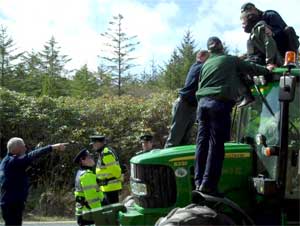 “Give me your name and address or I’ll rape you” - the words of a Garda Sgt as he discussed with at least two other Gardai how they were going to interrogate one of two female Shell to Sea campaigners they had arrested and who were being brought to Belmullet Garda station. Just second earlier while they were discussing how to interrogate the women one Garda suggested they threaten her with deportation. The Sgt responds with the addition of the rape threat which he repeats before another so far unidentified Garda chimes in with “hold it there, give me your name and address there, I’ll rape you” prompting the Sgt to repeat it one last time as “or I’ll definitely rape you.” [Listen to the 2 minute audio]
“Give me your name and address or I’ll rape you” - the words of a Garda Sgt as he discussed with at least two other Gardai how they were going to interrogate one of two female Shell to Sea campaigners they had arrested and who were being brought to Belmullet Garda station. Just second earlier while they were discussing how to interrogate the women one Garda suggested they threaten her with deportation. The Sgt responds with the addition of the rape threat which he repeats before another so far unidentified Garda chimes in with “hold it there, give me your name and address there, I’ll rape you” prompting the Sgt to repeat it one last time as “or I’ll definitely rape you.” [Listen to the 2 minute audio]
Thoughts on the crash and the alternatives
 Our government has become more and more open about their plans for us. Cowen wants to drive down our living standards 12% and has already cut all our wages through the tax levy and slashed the wages of workers in the public sector further through the so called ‘pensions levy’. He openly talks of “four more years of even steeper cuts”. He is so confident of us taking this lying down that he had the cheek to announce his intention to drive down our living standards at what even RTE referred to as the “Dublin Chamber of Commerce's lavish AGM dinner which cost €160” a head.
Our government has become more and more open about their plans for us. Cowen wants to drive down our living standards 12% and has already cut all our wages through the tax levy and slashed the wages of workers in the public sector further through the so called ‘pensions levy’. He openly talks of “four more years of even steeper cuts”. He is so confident of us taking this lying down that he had the cheek to announce his intention to drive down our living standards at what even RTE referred to as the “Dublin Chamber of Commerce's lavish AGM dinner which cost €160” a head.
The politics and reality of the peak oil scare
 Peak Oil Theory has been around since the 1970s. Some think we have already reached 'peak oil', others think it will happen with the next twenty-five years. The theory argues that when we reach 'peak oil' the rate at which we extract oil from the earth (measured in millions of barrels per day) will reach a maximum and thereafter will start to drop.
Peak Oil Theory has been around since the 1970s. Some think we have already reached 'peak oil', others think it will happen with the next twenty-five years. The theory argues that when we reach 'peak oil' the rate at which we extract oil from the earth (measured in millions of barrels per day) will reach a maximum and thereafter will start to drop.
As the rate at which we use oil is currently close to the rate at which we extract it, the point of peak oil will coincide or be closely followed by the world consuming more oil than it is producing. As oil reserves are very limited, within months there simply will not be enough oil available.
Nationalism, socialism and partition
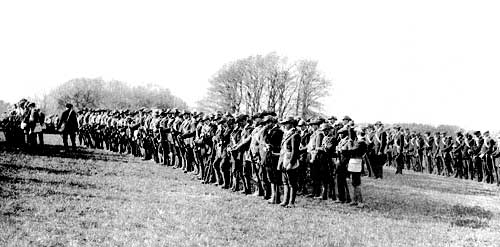 The period of Irish history from the 1880's to the 1920's defined and divided politics including socialist politics, on the island for the rest of the century. The most militant workers struggles occurred in the second half of that period, north and south, concentrated in the last five years. This was also the period of the 1916 insurrection in Dublin, the 1918-21 War of Independence, the treaty and partition of Ireland in 1921 and then in the south the bloody Civil War ending in 1923.
The period of Irish history from the 1880's to the 1920's defined and divided politics including socialist politics, on the island for the rest of the century. The most militant workers struggles occurred in the second half of that period, north and south, concentrated in the last five years. This was also the period of the 1916 insurrection in Dublin, the 1918-21 War of Independence, the treaty and partition of Ireland in 1921 and then in the south the bloody Civil War ending in 1923.
The year 1919 saw the greatest demonstration of the potential of Irish workers, north and south to take over the running of society but the events of the following years cemented the division that would do much to end workers militancy. In terms of working class struggle the periods of militancy of northern and southern workers coincide. Yet the working class was divided and these struggles remained almost completely isolated from each other. (Image: UVF training in 1914)
Anarchism, insurrections and insurrectionalism
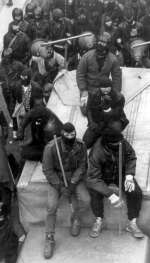 Insurrections - the armed rising of the people - has always been close to the heart of anarchism. The first programmatic documents of the anarchist movement were created by Bakunin and a group of European left-republican insurrectionists as they made the transition to anarchism in Italy in the 1860's. This was not a break with insurrectionism but with left-republicanism, shortly afterwards Bakunin was to take part in an insurrection in Lyon in 1870.m[Castellano]
Insurrections - the armed rising of the people - has always been close to the heart of anarchism. The first programmatic documents of the anarchist movement were created by Bakunin and a group of European left-republican insurrectionists as they made the transition to anarchism in Italy in the 1860's. This was not a break with insurrectionism but with left-republicanism, shortly afterwards Bakunin was to take part in an insurrection in Lyon in 1870.m[Castellano]

